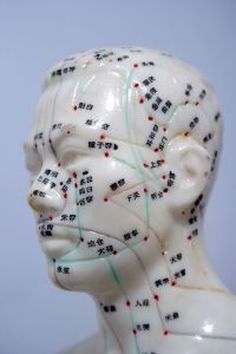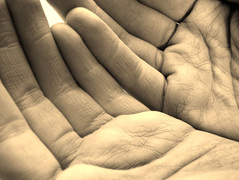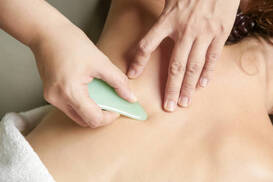Frequently Asked Questions

What is Acupuncture?
Acupuncture is a form of Chinese medicine that was developed over 3000 years ago and has been used as primary care in the East ever since. It consists of the insertion of thin, sterile, needles at specific points along the body's surface. Those needles are retained in the body for a period of time (typically 20-40 minutes) and then removed. Acupuncture is a holistic medical system that treats the entire individual rather than just a disease and its symptoms, and is highly customized medicine tailored at each patient's unique needs.
How does acupuncture work?
Studies suggest that acupuncture works by increasing circulation and decreasing inflammation both locally (near where needles are inserted) and systemically (throughout the body), enhancing the immune response, breaking up adhesions in the fascia that restrict movement, stimulating the release of endorphins and neurotransmitters, and more. According to Chinese medicine, acupuncture functions by stimulating the body’s own natural healing response and restoring balance by encouraging the smooth flow of energy (known as qi) through a network of invisible pathways that run along the body's surface and connect to the internal organs. As a result, acupuncture is able to address the root cause of problems rather than merely their symptoms.
Acupuncture is a form of Chinese medicine that was developed over 3000 years ago and has been used as primary care in the East ever since. It consists of the insertion of thin, sterile, needles at specific points along the body's surface. Those needles are retained in the body for a period of time (typically 20-40 minutes) and then removed. Acupuncture is a holistic medical system that treats the entire individual rather than just a disease and its symptoms, and is highly customized medicine tailored at each patient's unique needs.
How does acupuncture work?
Studies suggest that acupuncture works by increasing circulation and decreasing inflammation both locally (near where needles are inserted) and systemically (throughout the body), enhancing the immune response, breaking up adhesions in the fascia that restrict movement, stimulating the release of endorphins and neurotransmitters, and more. According to Chinese medicine, acupuncture functions by stimulating the body’s own natural healing response and restoring balance by encouraging the smooth flow of energy (known as qi) through a network of invisible pathways that run along the body's surface and connect to the internal organs. As a result, acupuncture is able to address the root cause of problems rather than merely their symptoms.

What can acupuncture treat?
Both the National Institutes of Health (NIH) and the World Health Organization (WHO) recognize acupuncture's ability to effectively treat a vast array of conditions. Some of these include pain, insomnia, anxiety/depression, GI disorders, allergies, cold and flu, women’s health and infertility, migraines, and post-chemotherapy side effects. For a more comprehensive list and additional research, click here. Everyone can benefit from acupuncture. Although primarily used to treat disease, it's holistic approach makes acupuncture an ideal choice for individuals interested in optimal health and preventative care.
How quickly can I expect to see results? How many treatments will I need?
Every patient is unique, and the number of treatments required to see results varies. Many patients feel relief after their very first treatment, however acupuncture has a cumulative effect, and longer lasting change requires more consistent treatment. Some acute problems may require as few as 2-4 sessions to be resolved, while more chronic or degenerative conditions may require more sustained long-term treatment over several months or longer.
Both the National Institutes of Health (NIH) and the World Health Organization (WHO) recognize acupuncture's ability to effectively treat a vast array of conditions. Some of these include pain, insomnia, anxiety/depression, GI disorders, allergies, cold and flu, women’s health and infertility, migraines, and post-chemotherapy side effects. For a more comprehensive list and additional research, click here. Everyone can benefit from acupuncture. Although primarily used to treat disease, it's holistic approach makes acupuncture an ideal choice for individuals interested in optimal health and preventative care.
How quickly can I expect to see results? How many treatments will I need?
Every patient is unique, and the number of treatments required to see results varies. Many patients feel relief after their very first treatment, however acupuncture has a cumulative effect, and longer lasting change requires more consistent treatment. Some acute problems may require as few as 2-4 sessions to be resolved, while more chronic or degenerative conditions may require more sustained long-term treatment over several months or longer.
Does it hurt?
No, acupuncture should never be painful. Acupuncture needles are hair-thin and the points needled will either feeling nothing at all or produce some light sensation (most often described as warmth, tingling, heaviness, or pressure). The majority of patients find acupuncture to be extremely relaxing and even fall asleep during treatment. If you experience any discomfort at a point, adjustments can be made to make it feel more comfortable, or we can use an alternative method of stimulating the point such as acupressure.
Is it safe?
Acupuncture is extremely safe when performed by a trained, licensed practitioner. At Jillian Sobo Acupuncture, we use only sterile, single use stainless steel needles. The needles are solid with no substances being removed from or injected into the body. Though it is a rare occurrence, the most common negative side effects of acupuncture are minor superficial bruising and a short-term mild ache at the site of needle insertion.
No, acupuncture should never be painful. Acupuncture needles are hair-thin and the points needled will either feeling nothing at all or produce some light sensation (most often described as warmth, tingling, heaviness, or pressure). The majority of patients find acupuncture to be extremely relaxing and even fall asleep during treatment. If you experience any discomfort at a point, adjustments can be made to make it feel more comfortable, or we can use an alternative method of stimulating the point such as acupressure.
Is it safe?
Acupuncture is extremely safe when performed by a trained, licensed practitioner. At Jillian Sobo Acupuncture, we use only sterile, single use stainless steel needles. The needles are solid with no substances being removed from or injected into the body. Though it is a rare occurrence, the most common negative side effects of acupuncture are minor superficial bruising and a short-term mild ache at the site of needle insertion.

What kind of training should I look for in an acupuncturist?
An acupuncturist should be licensed by the board of medicine in the state in which they are practicing, and have fulfilled a very specific set of credentials and training. Requirements for licensure differ according to state, so check with your state's board of medicine to find out what is required by acupuncturists in your area. In the state of MA, acupuncture licenses are granted by the Massachusetts Board of Medicine, which requires completion of a series of rigorous national board exams administered by the National Certification Commission for Acupuncture and Oriental Medicine, and a Master's degree from an institution accredited by the Accreditation Commission for Acupuncture and Oriental Medicine. Accredited acupuncture programs include extensive classroom and clinical training totaling approximately 3000 hours, in addition to training in the Western sciences. A Master of Acupuncture (M.Ac.) degree signifies training in acupuncture, while a Master of Acupuncture and Oriental Medicine (MAOM) degree signifies training in both acupuncture and Chinese herbal medicine.
Will my acupuncture treatment be covered by insurance?
Some insurance companies do cover acupuncture, however, you will need to check with your health insurance provider to find out whether out of network acupuncture is covered by your specific plan. If so, Jillian Sobo Acupuncture can provide you with a Superbill receipt that you may submit to your insurance company for reimbursement. We also do accept HSA and FSA cards.
An acupuncturist should be licensed by the board of medicine in the state in which they are practicing, and have fulfilled a very specific set of credentials and training. Requirements for licensure differ according to state, so check with your state's board of medicine to find out what is required by acupuncturists in your area. In the state of MA, acupuncture licenses are granted by the Massachusetts Board of Medicine, which requires completion of a series of rigorous national board exams administered by the National Certification Commission for Acupuncture and Oriental Medicine, and a Master's degree from an institution accredited by the Accreditation Commission for Acupuncture and Oriental Medicine. Accredited acupuncture programs include extensive classroom and clinical training totaling approximately 3000 hours, in addition to training in the Western sciences. A Master of Acupuncture (M.Ac.) degree signifies training in acupuncture, while a Master of Acupuncture and Oriental Medicine (MAOM) degree signifies training in both acupuncture and Chinese herbal medicine.
Will my acupuncture treatment be covered by insurance?
Some insurance companies do cover acupuncture, however, you will need to check with your health insurance provider to find out whether out of network acupuncture is covered by your specific plan. If so, Jillian Sobo Acupuncture can provide you with a Superbill receipt that you may submit to your insurance company for reimbursement. We also do accept HSA and FSA cards.
Jillian Sobo Acupuncture, LLC.
[email protected]
617-898-0798